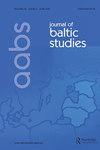关键时刻的波罗的海地区治理(1991-2021):跨国组织和政府间组织如何应对外部区域变化?
IF 0.5
4区 社会学
Q2 AREA STUDIES
引用次数: 0
摘要
自东西方冲突结束以来,各种政府间组织和跨国组织共同治理波罗的海地区。通过探索海陆司令部、波罗的海国家理事会和波罗的海城市联盟这三个组织结构的主要特点,我们了解在过去三十年中,它们的机构在影响该地区的关键时刻是如何演变的。研究结果表明,特定目的组织在变化方面比通用目的组织更健壮,而通用目的组织则可能不那么健壮。随着地缘政治紧张局势和全球动荡的加剧,这一发现为未来以及波罗的海地区以外的跨国合作的设计提供了经验教训。本文章由计算机程序翻译,如有差异,请以英文原文为准。
Governing the Baltic Sea Region at critical junctures (1991–2021): How do transnational and intergovernmental organizations cope with external regional change?
ABSTRACT Since the end of the East-West conflict, various intergovernmental and transnational organizations have collectively governed the Baltic Sea Region. Exploring key features of the organizational architecture of three such organizations – HELCOM, the Council of the Baltic Sea States, and the Union of Baltic Cities – we ask how their institutions evolved in the aftermath of critical junctures affecting the region over the past three decades. Findings show that specific-purpose organizations are robust with respect to changes than general-purpose organizations whereas general-purpose maybe less so. With growing geopolitical tensions and global turbulence, this finding holds lessons for the design of transnational cooperation in the future – and beyond the Baltic Sea Region.
求助全文
通过发布文献求助,成功后即可免费获取论文全文。
去求助
来源期刊

Journal of Baltic Studies
AREA STUDIES-
CiteScore
1.20
自引率
0.00%
发文量
52
期刊介绍:
The Journal of Baltic Studies, the official journal of the Association for the Advancement of Baltic Studies (AABS), is a peer-reviewed, multidisciplinary journal for the purpose of advancing the accumulation of knowledge about all aspects of the Baltic Sea region"s political, social, economic, and cultural life, past and present. Preference is given to original contributions that are of general scholarly interest. The Association for the Advancement of Baltic Studies is an international, educational, and scholarly non-profit organization. Established in 1968, the purpose of the Association is the promotion of research and education in Baltic Studies.
 求助内容:
求助内容: 应助结果提醒方式:
应助结果提醒方式:


